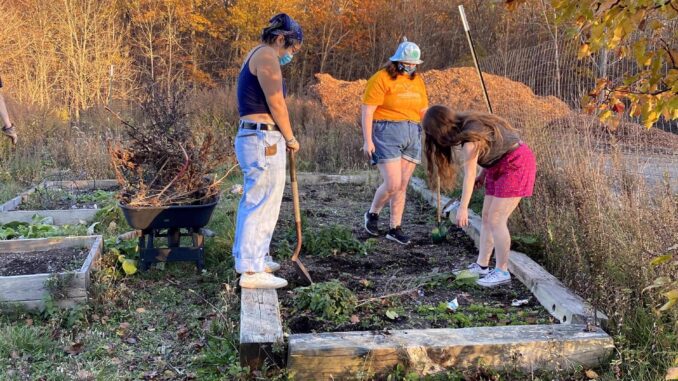
At the far end of campus, tucked behind Esopus, past the soccer fields and near the observatory, is a little farm with a huge, long-lasting environmental impact.
Our campus’ sustainable micro-farm has been around for as long as many students can remember. For years, our microfarm has been run by the Students for Sustainable Agriculture (SUSAG), a club on campus that recently merged with the Climate Action Club in spring 2020. This merge resulted in the SUNY New Paltz Environmental Alliance or “EcoAllies,” an organization with a mission to promote environmentalism across campus. The main focus of the organization is environmental justice, education of the climate crisis, and the push for sustainable practices and agriculture.
Of course, sustainable agriculture is exactly what the micro-farm is all about. Nothing the EcoAllies club incorporates into their farming is harmful to the environment.
The students never till, which refers to manually turning over the land to make the soil more fertile. This causes disruptive, non-sustainable consequences over time such as erosion and also breaks up layers of biological matter and mixes it which disturbs the natural balance of the soil and causes it not to function properly.
The students also never use pesticides. Instead, there are plans in place to introduce plants and flowers into the farm that will attract bugs who will then eat harmful organisms. The farm also has cover cropping, which is a sheet that goes over the ground to prevent harmful bugs from getting in. Additionally, students never use fertilizer so there can never be any runoff into the waterways around the farm.
“It’s going back to the basics of what Indigenous people used to do when they farmed their land,” explained in-person microfarm manager Zoë Foery, a third-year biology major with a double minor in environmental geochemistry and geology. “It’s nothing new, it’s just people realizing that we have to do something different.”
A sustainable micro-farm on campus does not only have long-term benefits for the environment, but for students as well.
Foery explained that one of the main missions of SUSAG has always been to teach food sovereignty. When you have food sovereignty, you have self-sovereignty. Working on the microfarm teaches students how to grow their own food in a sustainable way. Every student on campus is free to volunteer and work on the microfarm, to learn about sustainable farming and agriculture and to grow crops they can eat and cook with.
Fourth-year, double major in education and music and remote micro-farm manager Shannon Blakeley, hopes that the farm can continue to have a long-term impact for the campus community.
Her hope is that the farm continues to be “for the future generations of New Paltz. For future students to be able to have the opportunity that we’re having currently.”
It’s important for current students to harvest the growth of this micro-farm for years to come, as very recently, it almost became a thing of the past. Though the micro-farm had been running for years, it had to be abandoned at the start of the pandemic. With many students needing to leave campus during the Spring 2020 semester and many of the former student leaders of the micro-farm graduating at that same time, the farm saw a lull in work and began to fizzle out.
“The club [SUSAG] dissolved. There really wasn’t anything to merge with the Climate Action Club,” explained Foery. “I decided to be the person who helps merge the little seed of SUSAG in with the EcoAllies to make sure that we actually had things growing for the season.”
Foery describes the return of the microfarm as a sort of a coup. During the fall of 2020, they realized a lot of work needed to be done on the microfarm to restore it again. They explained that in January, they started to work on the farm again to get it ready for the spring season.
Blakely had wanted to stay involved with the organization like she had been in the past despite not being in-person. She reached out to the president of EcoAllies when she saw a post about the microfarm needing a manager, she explains that they later reached out to Foery and the two became a team.
Now, Foery oversees the workdays that take place at the micro-farm. During these allotted times, volunteers and club members tend to the work that needs to be done on the farm to harvest growth. Foery explained that most of the work takes place at the end of the Spring semester which is the beginning of the season. Currently, there’s lots of weeding that needs to take place, cleanup that needs to be done and work for preparing the beds. Foery added that composting is being done so the seeds can be planted in compost, and seedlings from the greenhouse also must be transplanted.
Blakely’s end of the work last fall involved getting into contact with former leaders of the micro-farm to see what needed to be done, planning for the spring, delegating who could take charge of different tasks in-person and ensuring that social distancing and covid-safe practices would be put into place.
With Blakely’s passion for gardening, Foery’s experience last year living and working on a community farm, and both of them having worked on the microfarm in the past — the two are a wonderfully suited team to lead the replanting, revamping and restoring of our campus’ small, sustainable farm.
To volunteer on the micro-farm, students can head to @ecoallies_np on Instagram and sign up for workdays through the link in their bio or reach out to Foery. Any and every student is encouraged to get involved.
